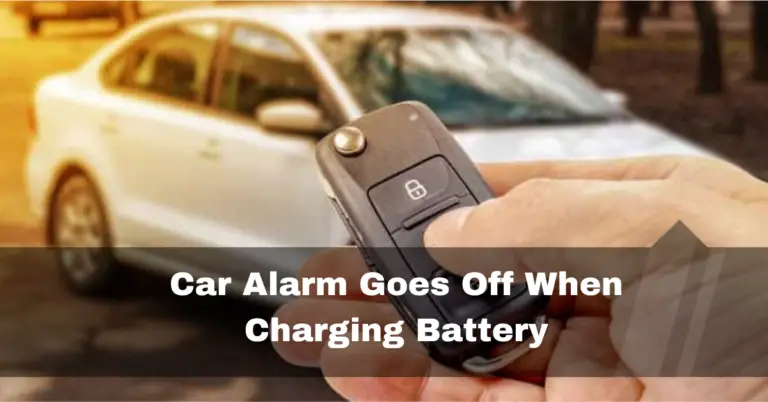Can A Car Battery Get Wet? – Sharing My Experience In 2024
I learned this firsthand in a challenging situation. During a heavy rainstorm, water found its way under my car hood, and despite the protective casing, the battery was exposed.
Can car batteries get wet? (Short Answer)
The answer is yes; a car battery can get wet. However, the degree to which the battery is exposed to water or other liquids will affect the seriousness of the damage.
This article explores the effects of water on a car battery and what you should do if your battery gets wet.
Table of Contents
Can Car Batteries Get Wet?
Yes, car batteries can get wet to some extent. The exterior casing of a typical car battery is designed to provide a degree of protection against moisture, such as rain and splashes encountered during normal driving conditions.
This casing is often made of hard plastic that act as a shield, preventing water from directly entering the internal components.
What happens if batteries get wet?
Can a car battery go dead if it gets wet? A chemical reaction involving water and car batteries may produce hydrogen and oxygen gas.
If a battery comes into contact with moisture, it may result in overheating, leakage, or, in extreme situations, explosion. It is crucial to approach wet batteries carefully, refraining from use until they are thoroughly dried.

Is it bad if a battery gets wet? Yes, water can corrode the metal parts of the battery, including the terminals and internal parts. Due to this corrosion, the battery may last less time and maybe break sooner.
Also Read: Car Stalling After Battery Change
What To Do If Your Car Battery Gets Wet:
Acting quickly to reduce damage if your automobile battery becomes wet is crucial. Based on my personal experiences, here are the steps to follow:
1. Turn Off The Engine:
Prioritize shutting off the engine and unplugging the battery. It will stop the battery from receiving any electrical current, which might cause more harm.

2. Remove The Battery:
Can you use batteries after they get wet? To prevent harm to the cells and the gadgets they use, batteries that have come into contact with water should be thrown away immediately.
Carefully remove the battery from the vehicle if it is still overflowing with water. To avoid touching the liquid, be sure to wear safety gloves and eye protection.
Also Read: Can A Bad Battery Make Your Car Overheat
3. Rinse The Battery:
Will batteries work after getting wet? After the battery is removed, it should be rinsed with clean water. Avoid using a high-pressure washer since it can harm the battery. Instead, rinse the battery using a low-pressure pipe or bucket of water.

4. Dry The Battery:
After rinsing, dry the battery with a clean cloth or towel. Remove any excess moisture, especially around the terminals and other metal parts.
5. Test The Battery:
Test the battery to check if it is still functional once it has dried. You can test the voltage yourself with a voltmeter or have a professional do it.

Are car batteries waterproof?
No, Car batteries, much like other batteries, aren’t completely waterproof. Nevertheless, they are engineered to tolerate limited exposure to moisture without immediate harm.
It’s essential to recognize that the external shield serves to deter moisture from entering, but this shouldn’t be misconstrued as an invitation to submerge the car battery in water or expose it to heavy rain without the protection of a car hood.
Also Read: How Far Can A Car Drive On Battery Only
Can rain damage a car battery?
Despite what most people think, a wet car battery isn’t always a serious problem. A layer of moisture can protect the battery terminals from corrosion and keep the electrical link healthy.
One change is if too much water gets into the battery case. There may be a short circuit in this case, meaning the circuit needs replacing. If this isn’t fixed immediately, it could worsen until the batteries die, which is a serious fire risk.
While a small amount of water might not be a big deal right now, it’s best to follow best practices and keep your car battery as dry as possible.
Is it Safe to Jump Start a Car in the Rain?
Jump-starting your car in the rain is entirely safe. While the idea might raise concerns, considering the general caution about mixing electricity and water, it is a feasible and secure process, even in heavy rain. However, observing the right precautions and steps is crucial.
A brief review of some physics is needed to comprehend why this practice is safe. While water is a conductor of electricity, it is rather poor. Pure water doesn’t conduct electricity efficiently. However, the water encountered daily is not pure and contains various salts that enhance its conductivity.
Also Read: Car Only Starts When Jumped Battery Good
Safety Precautions for Jump-Starting Your Car in the Rain:
Even though jump-starting your car in the rain is deemed safe, it’s essential to adhere to specific safety measures to ensure a secure process:
- Avoid Standing Water: Move your car to a drier spot if possible. If not, be cautious about kneeling or sitting in water.
- Keep Hands Dry: Ensure your hands are dry when handling jumper cables.
- Inspect Cables: Check jumper cables for damage, especially exposed wires. Damaged cables may compromise protection against electric shocks.
can you change a car battery in the rain?
Yes, installing a car battery in the rain with certain precautions is possible. While the car’s 12-volt system doesn’t pose a significant risk of electric shock, the main concern during rainy battery installation is environmental rather than electrical.
If you find yourself needing to install a battery in the rain, adhere to the following safety measures:
- Keep It Dry: Make an effort to keep the new battery and your tools as dry as possible. Moisture can lead to corrosion over time.
- Be Careful: Wet conditions can make the battery slippery. Always use both hands when lifting and placing the battery. Avoid sudden movements that could result in dropping the battery.
- Use Protection: Wear gloves and safety glasses to shield yourself from battery acid.
Handling a car battery in the rain requires extra caution due to slippery conditions, especially considering the weight and potential corrosiveness of the battery.
Also Read: Car Dies When Removing Positive Battery Cable
Preventing Water Damage To Your Car Battery:
1. Keep The Battery Clean And Dry:
Regularly clean the battery and keep it dry to prevent any buildup of dirt or moisture. It will also help prevent corrosion and prolong the battery’s life.
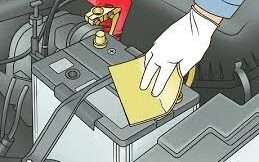
2. Check The Battery For Damage:
Inspect the battery regularly for any signs of damage, such as cracks or leaks. Should you have any damage repaired or replaced as soon as possible?
Also Read: How Long Does It Take To Charge A Car Battery At 6 Amps
3. Be Careful When Washing Your Car:
When washing your car, do not get water directly on the battery. Use a low-pressure tap or a bucket of water to clean the battery if necessary.

4. Store The Battery Properly:
If you must store the battery, keep it cold and dry. Avoid keeping it where it may come into contact with water or other liquids.
Car Battery Got Wet And Won’t Start?
Experiencing a wet car battery that won’t start can be frustrating, and I’ve encountered this situation before. Here’s a personalized guide based on my experience:
- Ensure Safety: Use protective gear if the battery is damaged or leaking.
- Check for Damage: Inspect the battery for visible issues like cracks or corrosion.
- Dry the Battery: Gently dry the battery with a cloth, ensuring terminals are moisture-free.
- Inspect Terminals: Clean corroded terminals with a baking soda-water mixture.
- Jump Start: Attempt a jump start using cables or a portable jump starter.
- Charge the Battery: If successful, charge the battery with a proper charger.
- Professional Assistance: If issues persist, seek help from a mechanic for inspection or replacement.
- Prevent Future Issues: Keep the battery dry and protected, and ensure the vehicle’s hood is closed during adverse weather.
Your wet automobile battery most certainly short-circuited and died if it won’t start. To get your automobile running again, the battery needs to be replaced. An auto repair business will replace your automobile battery for $200.
Can A Car Battery Get Rained On?
Yes, a car battery can typically withstand exposure to rain. The external casing of a car battery is designed to be resistant to moisture and is often made of materials like hard plastic or rubber.
This casing acts as a protective barrier, helping to prevent water from directly entering the battery’s internal components.
Also Read: Can You Drink Car Battery Water
wet battery terminals:
Wet battery terminals on a car battery, often due to rain exposure, can lead to corrosion. Corrosion impedes electrical flow, reducing conductivity and causing poor contact with the vehicle’s electrical system.
Regular cleaning with a baking soda and water mixture, followed by a protective coating application, helps prevent corrosion. Always wear protective gear when handling batteries.
Related Questions:
1. Can A Wet Car Battery Still Be Good?
If a battery gets wet is it still good? It’s not likely that a little rain or a splash will hurt most lithium cells. But even though they’re somewhat waterproof, putting any battery in water could damage it. If water gets into lithium batteries, it can slow them down or make them useless in the long run.
2. Is It Safe To Change A Car Battery In The Rain?
No, Changing a car battery in the rain is not safe. Water’s capacity to conduct electricity increases the risk of an electrical shock or a short circuit in the car’s electrical system. Experts recommend waiting for dry weather conditions before attempting to replace the battery.
3. if Batteries Get Wet, Are They Ruined?
Do batteries work after getting wet? It depends on the degree of exposure to water. If the battery is fully flooded in water for a long time, it will likely be permanently damaged. Most lithium batteries will stand up fine to a little rain or an accidental splash. However, if the battery is only slightly wet, it may still be usable if dried and cleaned properly.
4. What Happens If A 12v Battery Gets Wet?
What happens if car battery gets wet? The corrosive nature of water can affect a 12V battery if it gets wet. Even freshwater can cause damage to the battery, leading to rust formation and slower discharge rates over time.
5. How Long Do Wet Car Batteries Last?
The lifespan of a wet cell lead-acid battery, in areas with high temperatures, lasts as little as 3 years, even having a long warranty. In more normal climates, the average lifespan is 4-5 years, while an AGM (Absorbed Glass Mat) battery can last up to 6 or 7 years.
6. Can A Wet Battery Cause A Fire?
Of Course! Yes, a wet battery can cause a fire. Water can induce a short circuit that results in heat and sparks when it comes into touch with the metal components of the battery. It can cause a fire by burning combustible substances like oil or petrol.
7. Can water damage a car battery?
Rain alone does not typically affect a car battery. However, if there are leaks in the car’s hood or the battery’s case, water can enter and cause corrosion or other damage. It’s important to regularly inspect and maintain your car’s battery to prevent potential issues.
8. What Happens If A Lithium And AA Battery Gets Wet?
What happens if car battery gets wet? If a lithium or AA battery gets wet, it can cause the battery to short circuit and leak or rupture. Water can also cause the chemicals inside the battery to react and produce heat or gas, leading to further damage or even a fire or explosion.
9. Can you use AA batteries that got wet?
No, using AA batteries that have gotten wet is not advisable. Handling wet batteries, especially if submerged in water, poses risks. It’s crucial to exercise caution and refrain from using wet batteries until they are completely dry. If a battery has been submerged, it’s best to dispose of it properly rather than attempting to use it.
10. how to fix a car radio that got wet?
If your car radio gets wet:
- Turn off the car and disconnect the power.
- Remove the radio if possible.
- Pat dry; use compressed air or silica gel for drying.
- Inspect for corrosion after drying.
- If issues persist, seek professional assistance.
- Identify and fix the source of water exposure.
Conclusion:
In conclusion, mishandling a wet car battery can cause serious damage. Hydrogen and oxygen gas, which can accumulate around the battery and cause swelling and corrosion, can be produced via a chemical reaction sparked by water. If a little water does get on the battery, it probably won’t cause any damage. If the battery is fully overflowing in water, take immediate action and necessary precautions to prevent water damage to the battery in the future.
Also Read:
- Why Does My Car Battery Get Hot When Charging
- Can Bottled Water Be Added To A Battery
- Car Alarm Goes Off When Charging Battery
- Will Car Alarm Go Off If Battery Dead

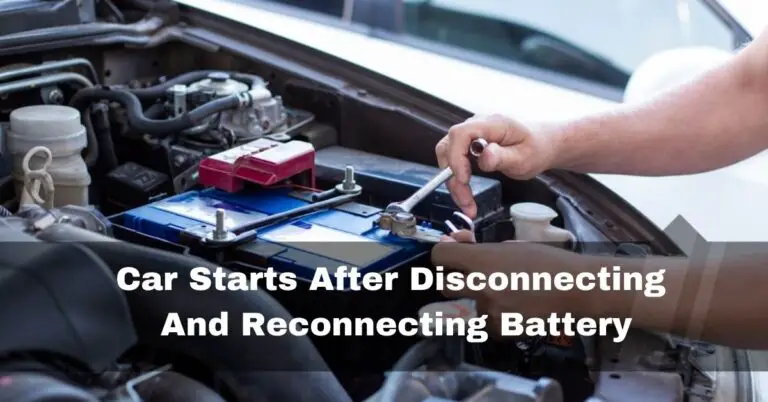
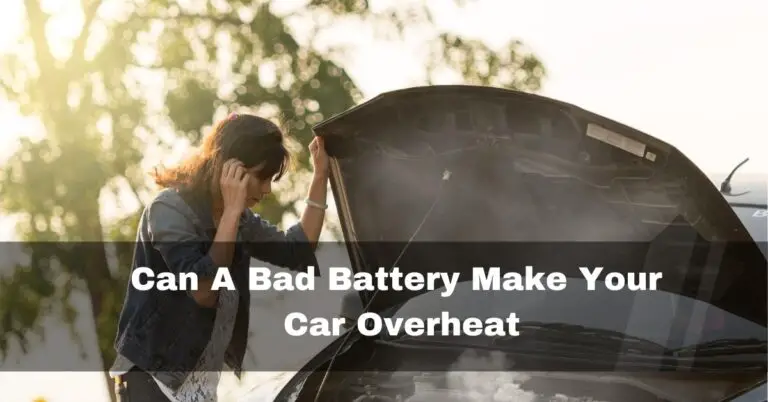
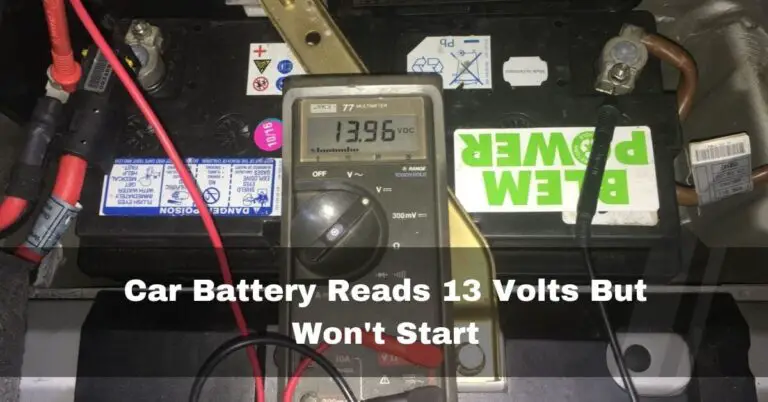
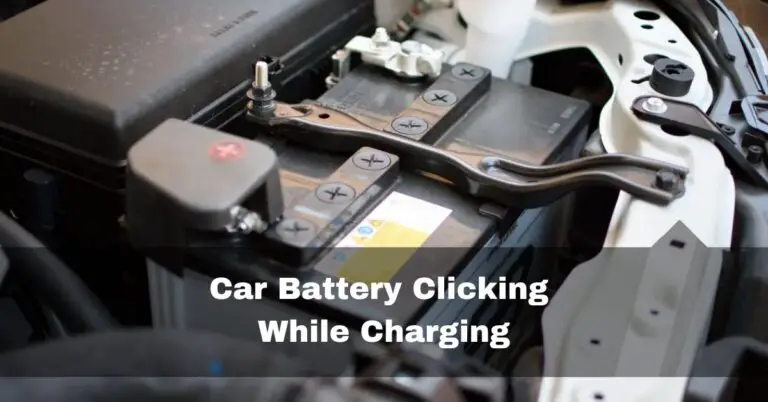
![Battery Only Reading 10v – [2024] Why? Should I Recharge It](https://vehicleslounge.com/wp-content/uploads/2023/07/Battery-Only-Reading-10v-768x402.jpg)
